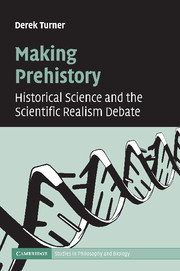Book contents
- Frontmatter
- Contents
- List of figures
- Acknowledgments
- Introduction
- 1 Asymmetries
- 2 The colors of the dinosaurs
- 3 Manipulation matters
- 4 Paleontology's chimeras
- 5 Novel predictions in historical science
- 6 Making prehistory: could the past be socially constructed?
- 7 The natural historical attitude
- 8 Snowball Earth in the balance
- Conclusion
- References
- Index
2 - The colors of the dinosaurs
Published online by Cambridge University Press: 22 September 2009
- Frontmatter
- Contents
- List of figures
- Acknowledgments
- Introduction
- 1 Asymmetries
- 2 The colors of the dinosaurs
- 3 Manipulation matters
- 4 Paleontology's chimeras
- 5 Novel predictions in historical science
- 6 Making prehistory: could the past be socially constructed?
- 7 The natural historical attitude
- 8 Snowball Earth in the balance
- Conclusion
- References
- Index
Summary
In my study I have a black-and-white photograph of my grandfather as a young man, standing in front of a house holding a lunchbox. I sometimes wonder what, if anything, was in the lunchbox. That is a simple question about the past that no one will ever be able to answer. Many questions in historical science are like that: for instance, asking about the colors of the dinosaurs is just like asking what was in my grandfather's lunchbox. In this chapter, I argue that these unanswerable questions – which I will call local underdetermination problems – are more common in historical science than in experimental science. This is one consequence of the role asymmetry of background theories.
In Chapter 1, I described one example of an asymmetry in time: the time asymmetry of knowledge. In this chapter, I will begin with another alleged asymmetry in time: the asymmetry of overdetermination. Carol Cleland (2002) has recently invoked David Lewis's (1979) thesis of the time asymmetry of overdetermination in order to answer the charge that prototypical historical science is epistemically inferior to classical experimental science. Cleland argues that the asymmetry of overdetermination is a fact about our universe that underwrites the distinctive methodologies of historical and experimental science, guaranteeing that the one methodology is, epistemically speaking, just as good as the other. In this chapter, I argue that Lewis's notion of the asymmetry of overdetermination cannot do the work that Cleland wants it to do.
- Type
- Chapter
- Information
- Making PrehistoryHistorical Science and the Scientific Realism Debate, pp. 37 - 60Publisher: Cambridge University PressPrint publication year: 2007



